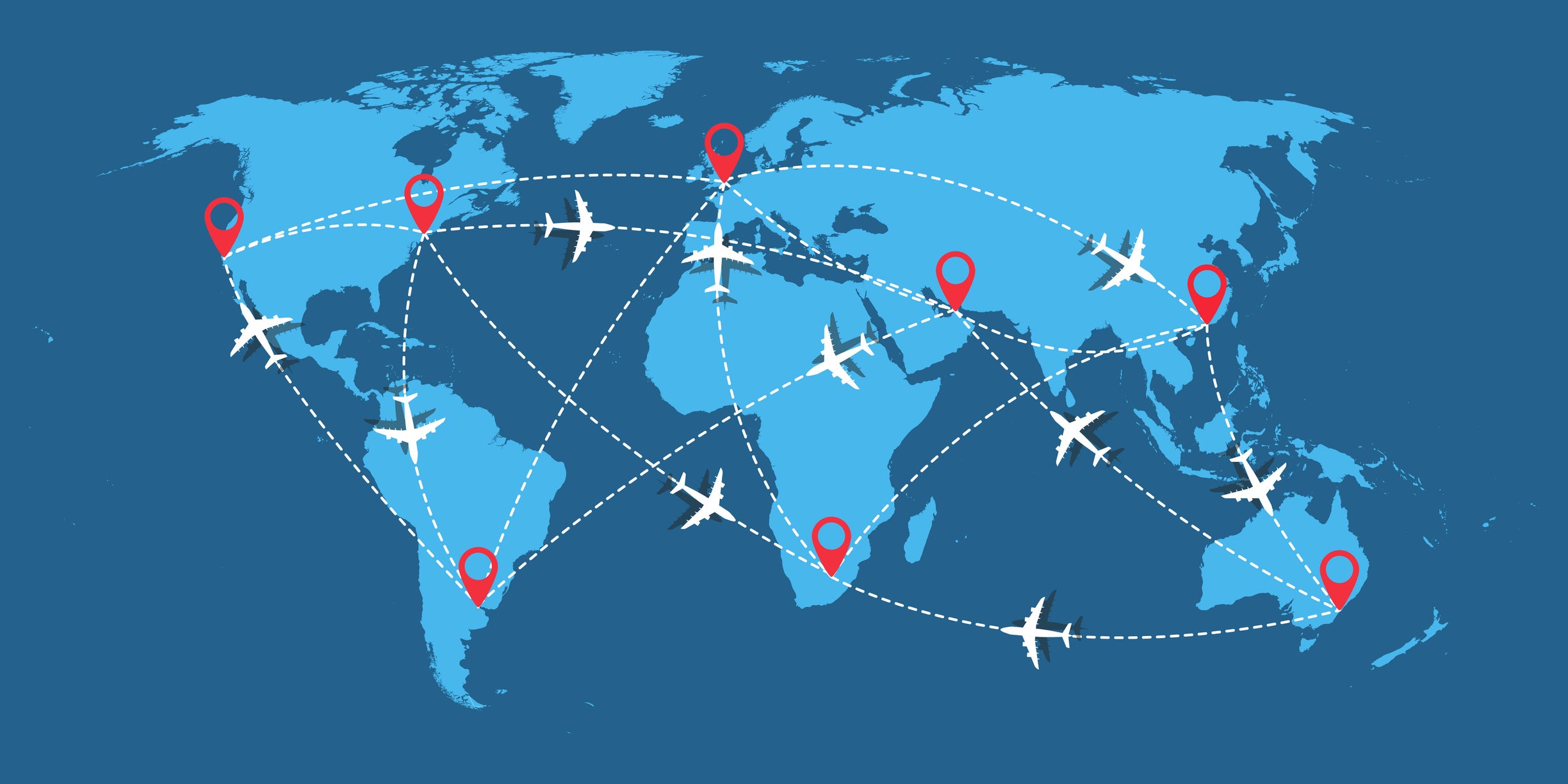
[ad_1]
“Skiplagging” is a hot topic in travel right now. So what exactly is this and is it worth the risk?
This week, American Airlines temporarily detained a U.S. teenager after he allegedly used a flight hacking technique known as skiplagging (also known as “hidden city ticketing”) to book a cheaper flight to his destination.
According to Carolina’s Queen City News, the teenager was scheduled to fly from Gainesville, Florida, to New York City, but he planned to disembark during a layover in Charlotte. His North Carolina driver’s license reportedly raised red flags for gate agents about his true final destination, so he was reportedly escorted to a secure area where he was questioned. His ticket was ultimately canceled, and his family was forced to pay for a new, more expensive flight for him to get home.
With that cautionary tale in mind, here’s a breakdown of what skiplagging is — and why the risks might not be worth the potential rewards.
Related: Nonstop vs. direct flights
What is skiplagging?
Broadly speaking, skiplagging is the art of exploiting certain flight routes by booking a multistop flight where one of the layovers is your intended destination rather than booking a more expensive ticket directly to that destination. Upon reaching the stopover airport, you end your trip there by just getting off the plane and walking away, skipping the following legs of the itinerary. You may have heard of the website Skiplagged.com which allows regular folks to book these tickets.
For example, a passenger might book a flight between New York and Las Vegas with a layover in Dallas. In this instance, Dallas would be the intended destination and where the passenger would vacate, cutting the journey short and not continuing to Las Vegas.
So, why would a passenger do this?
It’s counterintuitive, but in certain instances, this controversial tactic can bring notable cash savings. This is because flight pricing doesn’t always follow the logical assumption that a longer trip should be more expensive. Instead, the cost of a journey is often based on how popular the destination or route is — especially if it’s nonstop — and the price at which the airlines have decided people will buy tickets.
Sign up for our daily newsletter
At face value, skiplagging also known as hidden city ticketing may seem like a smart strategy to save money while taking advantage of illogical airfare pricing, but it is not without risk.
As we’ve seen this week, the money saved might not be worth it if you get caught — a real risk as some airlines crack down on the practice as they increasingly employ technology to help identify suspicious itineraries.
Is skiplagging illegal?
Skiplagging is technically legal, but this doesn’t mean it doesn’t bring potential risks.
You may not face criminal charges for skiplagging or hidden city ticketing, but it’s a violation of most airline policies. If an airline catches you skiplagging, in most scenarios it will punish you as per the terms and conditions of the ticket you’re flying on. The punishments could range from financial penalties to restrictions on future booked travel.
In some instances, skiplagging passengers have been taken to court by the airline. In 2019, Lufthansa sued a passenger after they paid 657 euros for a business-class ticket from Oslo to Seattle via Frankfurt.
On the return flight, the passenger skipped the Oslo leg, flying on from Frankfurt to Berlin on a different ticket instead. Lufthansa claimed the ticket should have cost 2,769 euros and demanded a repayment of 2,112 euros plus interest.
The court ultimately sided with the passenger but, notably, agreed the airline’s case for suing was valid. Lufthansa lost due to the technical details of the new price calculation, which the court viewed as lacking transparency. The case could have easily gone the other way. Courts in Spain have reached similar conclusions in cases involving Iberia.
This current precedent puts the law in favor of the passenger. However, it’s not clear cut, and court battles can see ramped-up legal fees that most passengers can’t afford to challenge. Moreover, even if you aren’t breaking the law, the airline can decide it doesn’t wish to serve you as a passenger any longer, wipe out your frequent flyer accounts. You could forfeit all your hard-earned points.
It could even ban you from the airline.
In short, skiplagging isn’t breaking the law. However, if you’re caught, airlines will not be happy that you are costing them money and could opt to try to penalize you or challenge you in court. Regardless of how you’d fare in a court challenge, getting to that point could be both lengthy and costly.
Can you save money by skiplagging, and is it worth it?
In certain instances, you can save considerable amounts by skiplagging, but it won’t be possible for all routes, and the amount you save depends on the flight.
For example, TPG found you could save $659 by using skiplagging to fly from John F. Kennedy International Airport (JFK) to Amsterdam Airport Schiphol (AMS).
In this example, booking a one-way flight from JFK with a final destination of London City Airport (LCY) and a layover at AMS would cost $458.
Booking the same flight but with Amsterdam as your final destination would cost $1,117. This is a considerable difference, making it easy to understand why this hidden city sort of ticketing might seem appealing.
By comparison, on other routes, the savings can be much less.
For example, flying from Newark Liberty International Airport (EWR) to Los Angeles International Airport (LAX) would cost $160, whereas flying from Newark to Salt Lake City International Airport (SLC) with a stopover at LAX is $147. By booking the multileg flight, you’d save $13.
Whether these savings are worth it depends on the risks you’re willing to take — which, in our view, are likely not worth the reward.
Sure, a savings of $659 is a lot of money, but if you get caught and must buy a new ticket that covers the full fare, you’ll end up considerably out of pocket. Even worse, the airline you’re flying with could ban you.
Related: 22 great tips for traveling on a budget
There are plenty of other effective ways to find ways to save on airfare that don’t carry any risks. The savvy use of points and miles, for one, could save hundreds of dollars on your flight and open up premium cabins that may not have been within your budget if you were paying with cash.
Being flexible with travel dates and destinations can also help. Using travel tools to help you find the best (legitimate) flight deals is also a good idea. Additionally, you might consider rail or bus options instead of flying if you’re traveling domestically.
What are the risks of skiplagging?
Skiplagging may not be illegal in the eyes of the law, but it can be damaging for the passenger doing it, the airline and, to a lesser extent, other passengers.
If you’re caught, it could cost you. According to American Airlines’ terms and conditions, this might involve:
- Canceling any unused part of your ticket. If you’re booked on a round-trip flight, this would void the return part of your journey, even if it’s an open jaw from a different city.
- Refusing to allow the passenger to fly without the option of a refund — even if you booked an otherwise refundable ticket.
- Being charged for the full actual cost of your ticket.
In other instances, airlines have also been known to blacklist passengers from future flights and cancel their frequent flyer numbers or points and miles accounts — wiping their accrued balance or elite status benefits.
Those are just the financial implications. Skiplagging can pose other risks too. For example, you won’t be able to check your luggage as you won’t be at the final destination to collect it. And sometimes, customers are forced to check carry-on bags when the overhead bins fill, so having to check a bag can be out of your control.
Another risk: If your flight is rerouted without your planned stopover due to delays or cancellations, you could find yourself stuck with few good options. Or, if your original itinerary is canceled and the airline rebooks you on a nonstop flight that skips your intended connection point altogether.
In those circumstances, you could find yourself on a flight to a destination you never wanted to visit without accommodations or the option to reach your destination beyond booking another last-minute flight.
Skipping a leg of your journey can also affect other passengers and the airline you’re flying with. According to an American Airlines spokesperson, “If a customer knowingly or unknowingly purchases a ticket and doesn’t fly all of the segments in their itinerary, it can lead to operational issues with checked bags and prevent other customers from booking a seat when they may have an urgent need to travel.”
In short, “Intentionally creating an empty seat that another customer or team member could have used is an all-around bad outcome.”
Related: Best credit cards for earning airline elite status
Bottom line
Skiplagging, or hidden city ticketing, might seem like a smart and financially savvy way to cut your travel costs. But, it carries with it some very real risks.
You can end up with an unexpected last-minute bill from the airline for the cost difference or, worse, blacklisted from the airline and losing out on a haul of airline miles you’ve spent years accruing. So while we love a good saving tip, this is one we’re going to skip out on.
In short, please don’t do it!
Related reading:
[ad_2]






